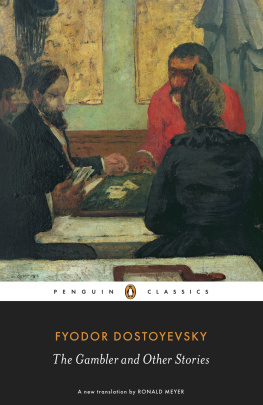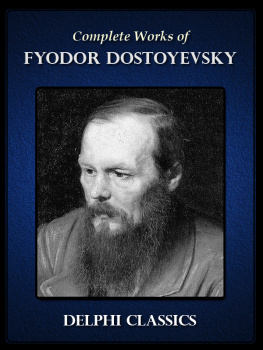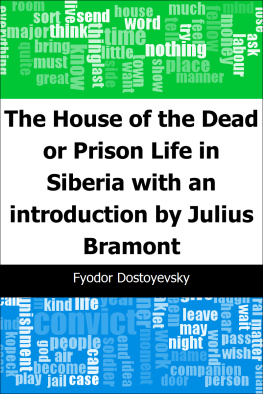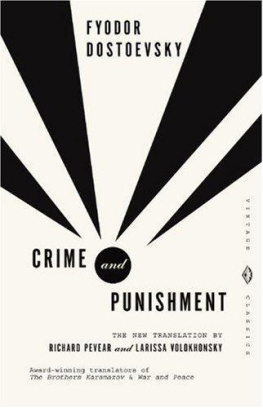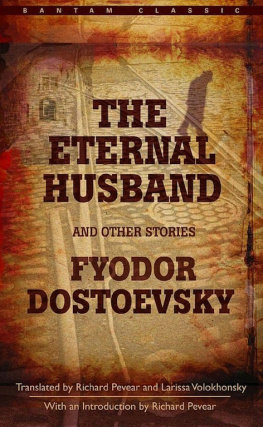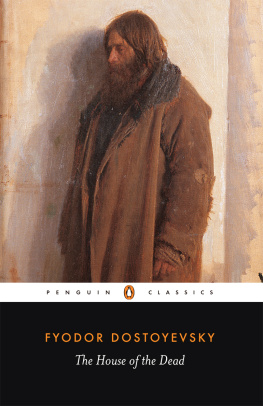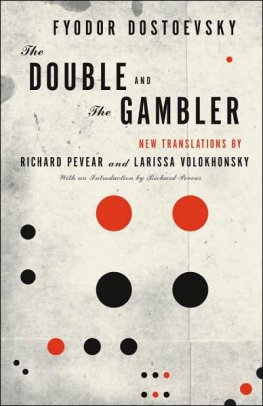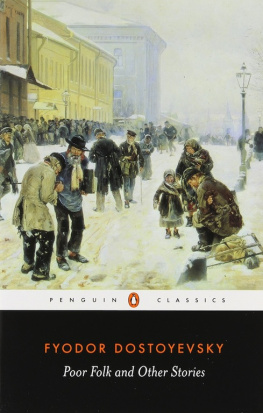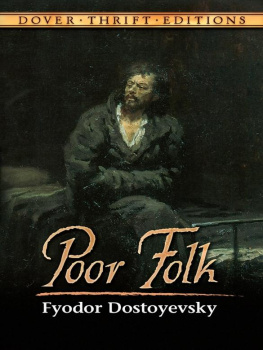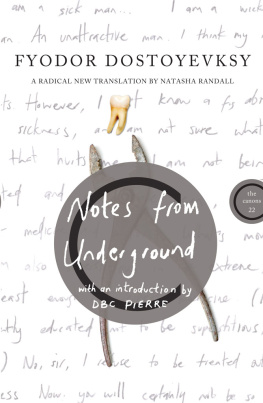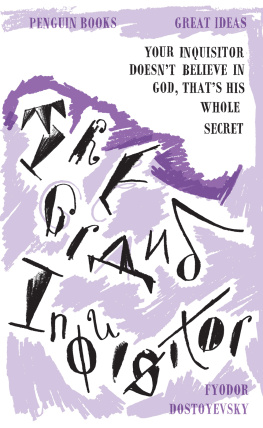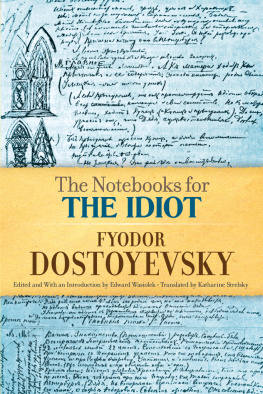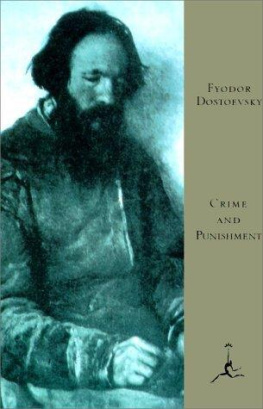Fyodor Dostoyevsky - The Gambler and Other Stories
Here you can read online Fyodor Dostoyevsky - The Gambler and Other Stories full text of the book (entire story) in english for free. Download pdf and epub, get meaning, cover and reviews about this ebook. year: 2010, publisher: Penguin Books Ltd, genre: Art. Description of the work, (preface) as well as reviews are available. Best literature library LitArk.com created for fans of good reading and offers a wide selection of genres:
Romance novel
Science fiction
Adventure
Detective
Science
History
Home and family
Prose
Art
Politics
Computer
Non-fiction
Religion
Business
Children
Humor
Choose a favorite category and find really read worthwhile books. Enjoy immersion in the world of imagination, feel the emotions of the characters or learn something new for yourself, make an fascinating discovery.
- Book:The Gambler and Other Stories
- Author:
- Publisher:Penguin Books Ltd
- Genre:
- Year:2010
- Rating:3 / 5
- Favourites:Add to favourites
- Your mark:
- 60
- 1
- 2
- 3
- 4
- 5
The Gambler and Other Stories: summary, description and annotation
We offer to read an annotation, description, summary or preface (depends on what the author of the book "The Gambler and Other Stories" wrote himself). If you haven't found the necessary information about the book — write in the comments, we will try to find it.
The Gambler and Other Stories — read online for free the complete book (whole text) full work
Below is the text of the book, divided by pages. System saving the place of the last page read, allows you to conveniently read the book "The Gambler and Other Stories" online for free, without having to search again every time where you left off. Put a bookmark, and you can go to the page where you finished reading at any time.
Font size:
Interval:
Bookmark:
FYODOR
DOSTOYEVSKY
and Other Stories
Translated with an Introduction
and Notes by RONALD MEYER
PENGUIN BOOKS
PENGUIN CLASSICS
Published by the Penguin Group
Penguin Books Ltd, 80 Strand, London WC2R 0RL , England
Penguin Group (USA) Inc., 375 Hudson Street, New York, New York 10014, USA
Penguin Group (Canada), 90 Eglinton Avenue East, Suite 700, Toronto, Ontario, Canada M4P 2Y3 (a division of Pearson Penguin Canada Inc.)
Penguin Ireland, 25 St Stephens Green, Dublin 2, Ireland (a division of Penguin Books Ltd)
Penguin Group (Australia), 250 Camberwell Road, Camberwell, Victoria 3124, Australia
(a division of Pearson Australia Group Pty Ltd)
Penguin Books India Pvt Ltd, 11 Community Centre, Panchsheel Park, New Delhi 110 017, India
Penguin Group (NZ), 67 Apollo Drive, Rosedale, North Shore 0632, New Zealand
(a division of Pearson New Zealand Ltd)
Penguin Books (South Africa) (Pty) Ltd, 24 Sturdee Avenue, Rosebank, Johannesburg 2196, South Africa
Penguin Books Ltd, Registered Offices: 80 Strand, London WC2R 0RL , England
www.penguin.com
White Nights and A Christmas Party and a Wedding first published 1848
A Nasty Business first published 1862
The Gambler first published 1866
Bobok first published 1873
The Meek One first published 1876
The Dream of a Ridiculous Man first published 1877
This translation first published in Penguin Classics 2010
Translation and editorial material copyright Ronald Meyer, 2010
All rights reserved
The moral right of the translator and editor has been asserted
Except in the United States of America this book is sold subject to the condition that it shall not, by way of trade or otherwise, be lent, re-sold, hired out, or otherwise circulated without the publishers prior consent in any form of binding or cover other than that in which it is published and without a similar condition including this condition being imposed on the subsequent purchaser
ISBN: 978-0-14-194357-2
PENGUIN  CLASSICS
CLASSICS
THE GAMBLER AND OTHER STORIES
FYODOR MIKHAYLOVICH DOSTOYEVSKY was born in Moscow in 1821, the second of a physicians seven children. When he left his private boarding school in Moscow he studied from 1838 to 1843 at the School of Military Engineering in St Petersburg, graduating with officers rank. His first novel to be published, Poor Folk (1846), was a great success. In 1849 he was arrested and sentenced to death for participating in the Petrashevsky Circle; he was reprieved at the last moment but sentenced to penal servitude, and until 1854 he lived in a convict prison at Omsk, Siberia. Out of this experience he wrote The House of the Dead (18612). In 1861 he began the journal Vremya (Time) with his brother; in 1862 and 1863 he went abroad, where he strengthened his anti-European outlook, met Apollinaria Suslova, who was the model for many of his heroines, and gave way to his passion for gambling. In the following years he fell deeply in debt, but in 1867 he married Anna Grigoryevna Snitkina (his second wife), who helped to rescue him from his financial morass. They lived abroad for four years, then in 1873 he was invited to edit Grazhdanin (Citizen), to which he contributed his Writers Diary. From 1876 the latter was issued separately and had a large circulation. In 1880 he delivered his famous address at the unveiling of Pushkins memorial in Moscow; he died six months later in 1881. Most of his important works were written after 1864: Notes from Underground (1864), Crime and Punishment (18656), The Gambler (1866), The Idiot (1868), Demons (18712) and The Brothers Karamazov (1880).
RONALD MEYER teaches Russian literary translation at Columbia University. He is the editor of the Penguin edition of Dostoyevskys Demons, translated by Robert A. Maguire (2008), and Anna Akhmatovas My Half-Century: Selected Prose (1992); co-translator, with David Lowe, of The Complete Letters of Fyodor Dostoyevsky, volume 1 (1988); and co-editor of Russian Literature of the 1920s: An Anthology (1987). His other translations include works by Babel, Chekhov, Gogol, Lipkin, Nagibin and Palei.
1821 (30 October) Born Fyodor Mikhaylovich Dostoyevsky, in Moscow, the son of Mikhail Andreyevich, head physician at Mariinsky Hospital for the Poor, and Marya Fyodorovna, daughter of a merchant family.
1823 Pushkin begins Eugene Onegin.
1825 Decembrist uprising.
18316 Attends boarding schools in Moscow together with his brother Mikhail (b. 1820).
1836 Publication of the First Philosophical Letter by Pyotr Chaadayev.
1837 Pushkin is killed in a duel.
Mother dies. He and his brother Mikhail are sent to a boarding school in St Petersburg.
1838 Enters the St Petersburg Academy of Military Engineering as an army cadet (Mikhail is not admitted to the Academy).
1839 Father dies, perhaps murdered by serfs on his estate.
1840 Lermontovs A Hero of Our Time.
1841 Obtains a commission. Tries his hand at historical drama without success.
1842 Gogols Dead Souls.
Promoted to second lieutenant.
1843 Graduates from the Academy. Attached to St Petersburg Army Engineering Corps. Translates Balzacs Eugnie Grandet.
1844 Resigns his commission. Works on Poor Folk, his first novel.
1845 Establishes a friendship with Russias most prominent and influential literary critic, the liberal Vissarion Belinsky, who praises Poor Folk and acclaims its author as Gogols successor.
1846 Poor Folk and The Double published. While Poor Folk is widely praised, The Double is much less successful. Mr Prokharchin also published.
1847 Nervous ailments and the onset of epilepsy. A Novel in Nine Letters and The Landlady are published.
1848 Revolutions in Europe.
Several short stories published, including A Weak Heart, An Honest Thief, A Christmas Party and a Wedding and White Nights.
1849 Netochka Nezvanova published. (23 April) Arrested along with other members of the Petrashevsky Circle, and convicted of political offences against the Russian state. Sentenced to death, and taken out to Semyonovsky Square to be shot by firing squad, but reprieved moments before execution (22 December). Instead, sentenced to an indefinite period of exile in Siberia, to begin with eight years of penal servitude, later reduced to four years by Tsar Nicholas I.
1850 Prison and hard labour in Omsk, western Siberia.
1852 Death of Gogol.
1853 Outbreak of Crimean War.
1854 Released from prison, but immediately sent to do compulsory military service as a private in the infantry battalion at Semipalatinsk, south-western Siberia.
1855 Alexander II succeeds Nicholas I as Tsar; some relaxation of state censorship.
Promoted to non-commissioned officer.
1856 Promoted to lieutenant. Still forbidden to leave Siberia.
1857 Marries the widowed Marya Dmitriyevna Isayeva. Publication of The Little Hero, written in prison during the summer of 1849.
1859 Allowed to return to live in European Russia. (December) The Dostoyevskys return to St Petersburg. The Village of Stepanchikovo and its Inhabitants and Uncles Dream published.
1861 (19 February) Emancipation of serfs.
Mikhail starts a new literary journal, Vremya (Time). Dostoyevsky is not officially an editor, because of his convict status.
Next pageFont size:
Interval:
Bookmark:
Similar books «The Gambler and Other Stories»
Look at similar books to The Gambler and Other Stories. We have selected literature similar in name and meaning in the hope of providing readers with more options to find new, interesting, not yet read works.
Discussion, reviews of the book The Gambler and Other Stories and just readers' own opinions. Leave your comments, write what you think about the work, its meaning or the main characters. Specify what exactly you liked and what you didn't like, and why you think so.

